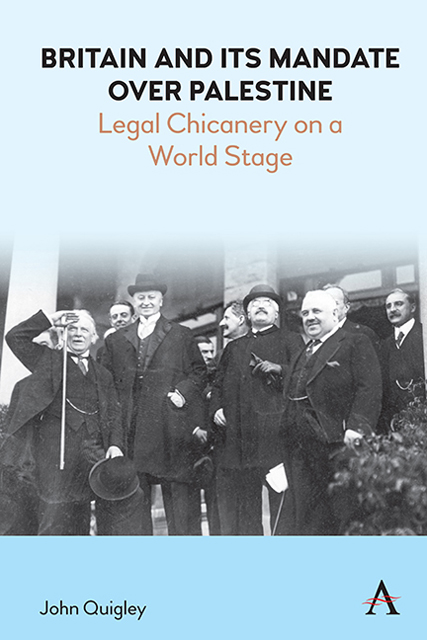Book contents
- Frontmatter
- Contents
- Preface
- Setting the Stage: Was Britain’s Rule in Palestine Legal?
- 1 The Balfour Declaration Is the Focal Point for the Legal Situation of Palestine
- 2 The Balfour Declaration Was a Binding Commitment to the Jewish People
- 3 The Jewish National Home Meant a Jewish State
- 4 The Balfour Declaration Was Issued to Affirm Jewish Rights in Palestine
- 5 The Paris Peace Conference Raised Jewish Statehood to the International Level
- 6 Britain’s Allies Made the Balfour Declaration an International Commitment
- 7 Britain’s Allies Endorsed Jewish Rights
- 8 Britain Took on Palestine Because of the League’s Mandate System
- 9 The League of Nations Protected Palestine’s Arab Population
- 10 Britain Was Given Palestine by the League of Nations
- 11 The League of Nations Put the Palestine Mandate into Legal Force
- 12 The Peace Treaty with Turkey Legalized Britain’s Status in Palestine
- 13 The Palestine Mandate Document Was a Treaty between Britain and the League
- 14 The League of Nations Required Britain to Implement the Balfour Declaration
- 15 The Palestine Mandate Document Implemented the League Covenant
- 16 The Palestine Mandate Document Recognized Jews as a National Group
- 17 The Palestine Mandate Document Bound Britain to the Balfour Declaration
- 18 The International Community Committed Itself to the Balfour Declaration
- 19 Britain Held Legal Status in Palestine
- 20 The United Nations Charter Carried Forward a Jewish Entitlement to Statehood
- Postscript: Why History Matters
- Documents Annex
- Notes
- Bibliography
- Index
Postscript: Why History Matters
Published online by Cambridge University Press: 10 January 2023
- Frontmatter
- Contents
- Preface
- Setting the Stage: Was Britain’s Rule in Palestine Legal?
- 1 The Balfour Declaration Is the Focal Point for the Legal Situation of Palestine
- 2 The Balfour Declaration Was a Binding Commitment to the Jewish People
- 3 The Jewish National Home Meant a Jewish State
- 4 The Balfour Declaration Was Issued to Affirm Jewish Rights in Palestine
- 5 The Paris Peace Conference Raised Jewish Statehood to the International Level
- 6 Britain’s Allies Made the Balfour Declaration an International Commitment
- 7 Britain’s Allies Endorsed Jewish Rights
- 8 Britain Took on Palestine Because of the League’s Mandate System
- 9 The League of Nations Protected Palestine’s Arab Population
- 10 Britain Was Given Palestine by the League of Nations
- 11 The League of Nations Put the Palestine Mandate into Legal Force
- 12 The Peace Treaty with Turkey Legalized Britain’s Status in Palestine
- 13 The Palestine Mandate Document Was a Treaty between Britain and the League
- 14 The League of Nations Required Britain to Implement the Balfour Declaration
- 15 The Palestine Mandate Document Implemented the League Covenant
- 16 The Palestine Mandate Document Recognized Jews as a National Group
- 17 The Palestine Mandate Document Bound Britain to the Balfour Declaration
- 18 The International Community Committed Itself to the Balfour Declaration
- 19 Britain Held Legal Status in Palestine
- 20 The United Nations Charter Carried Forward a Jewish Entitlement to Statehood
- Postscript: Why History Matters
- Documents Annex
- Notes
- Bibliography
- Index
Summary
The mandate system is sometimes described as a waystation between colonialism and independence. The population of Palestine had lived under foreign overlords, but not in classic colonialism. Under Turkey, the Palestine Arabs enjoyed considerable autonomy in local governance. They even held seats in Turkey's parliament. Britain not only assumed full control but, in collaboration with the Zionist Organization, inserted an outside population bent on taking over the country. The League of Nations, more through its weakness than as a matter of its policy, provided cover for Britain, lending an aura of pseudo-legality to its project. When the Arabs staged an armed revolt, as they did in 1936, Britain put it down so harshly that their capacity to protect themselves was severely reduced. As a result, the European settlers who came under Zionist auspices were able, a decade later, to force most of the Arabs out of the country.
The star of self-determination shone briefly at the Paris Peace Conference as Britain felt itself compelled to subject its conquest of Arab territory to a procedure that gave the appearance of limiting Britain's power. That appearance was largely illusory. Britain could decide on its own to remain in Palestine and to govern it. Britain could define the territory of Palestine. The mandate system required Britain to consult the population on the choice of a mandatory, and to allow for an indigenous government. Britain ignored these stipulations, and the League Council did nothing to enforce them. The Covenant, to be sure, gave the Council no enforcement authority, leaving Britain a free hand. The mandate system presupposed that a mandatory would hold legal title to the territory. Britain never gained that title, so even by the Council's standards, Britain had no legal authority over Palestine.
The peace treaty by which Turkey renounced sovereignty, the Treaty of Lausanne, gave no sovereignty to Britain or its Allies. Britain conceded that fact, as we saw, in the Permanent Court of Justice. It acknowledged to the Court that Britain had taken Palestine militarily during World War I and was holding it on that basis and on that basis alone.
- Type
- Chapter
- Information
- Britain and its Mandate over PalestineLegal Chicanery on a World Stage, pp. 149 - 156Publisher: Anthem PressPrint publication year: 2022

